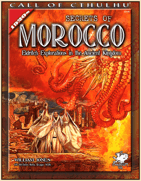
|
About OgreCave and its staff
|

|
by Demian Katz
Morocco isn't the first place you would think of to set a Call of Cthulhu game. Sure, it has a lot going for it as a setting for eldritch horror - varied terrain, including dangerous mountains and deserts, a long and war-torn history, and plenty of opportunities for culture shock and clash. It's just not on most people's radar screens; generally, having heard of Casablanca is the extent of most people's Moroccan knowledge. I have to confess to being among the ignorant masses, so I looked forward to learning a great deal while reading Secrets of Morocco. Sadly, in this and all other regards, I was disappointed.
In a Strange Land Besides being padded, the book suffers from major organizational problems. What little useful factual information is provided is often repeated in multiple places in the book or trails off before conveying enough detail to be of practical use in gameplay. You get to read about the details of the Treaty of Fez at least twice (nearly a hundred pages apart), but coverage of important historical figures generally limits itself to lists of names. The book repeatedly suggests that cultural misunderstandings and language differences can make for good role-playing, but it gives only a few fairly obvious examples of important cultural issues. Scenario-specific information is inserted throughout the book, cluttering things up and making it harder to find general information. There is no index or glossary, so when the book drops a vaguely familiar-sounding name, there is no easy way to figure out who or what it is talking about. Perhaps worst of all, unlike the other Secrets books I have read [see the Related reviews, below], there is no bibliography to help Keepers track down the information that is so clearly missing from this book. Seems like the author should have spent a bit more time on research.... Of course, organizational issues and spotty factual detail could be forgiven if there was good game material here. Unfortunately, there isn't. For having such an exotic setting, the book is stunningly unoriginal. Besides the previously-mentioned bland NPCs, we also have bland Mythos artifacts (A chest with a demon in it? A rare book about cults?), bland new rules (Developing second sight? Becoming immortal?) and bland scenarios. The first scenario has the players opposing a mad cultist trying to summon a Great Old One (no, really?), and takes place over a broad enough time scale that it really would better serve as a meta-narrative around a group of shorter, more focused adventures - too bad there's not enough material here to come up with any. The second scenario basically amounts to a dungeon crawl... and not an interesting one. There's also a mini-scenario involving an encounter with a monster during a strange desert phenomenon that resembles a rain of blood - probably one of the book's best efforts at making use of the unique setting, but far too little to make up for all the mediocrity around it.
Conclusions
Links:
|
||||
 Secrets of Morocco:
Secrets of Morocco: